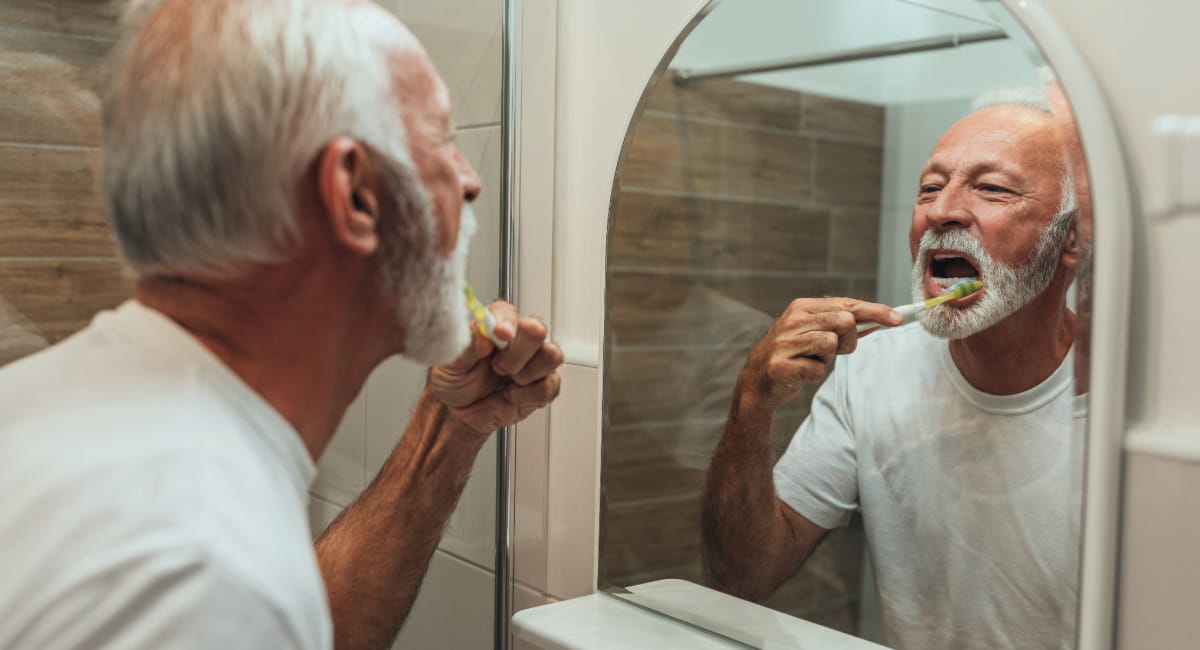“Good oral health still means regular brushing, flossing, being careful what we drink and eating healthy foods.”—Dr Naser Albarbari, registered dentist and oral surgeon.
Key points
- Poor oral health, including tooth decay, gum disease and infections, has been linked to major diseases.
- Keeping up a regular routine of brushing, flossing and eating non-sugary foods can help keep your teeth and gums healthy.
- Making regular appointments with your dentist will also assist in maintaining good oral health
Good—or bad—oral health can have a surprising effect on your overall health.
Poor oral health, including tooth decay, gum disease, infections and chronic inflammation, has been linked to major diseases such as cardiovascular disease. Diseases such as diabetes can lower the body’s resistance to infection and create or worsen oral health problems.
Dr Naser Albarbari, registered dentist and oral surgeon, says taking care of your teeth, gums and mouth is something that we can tackle in a variety of ways.
“The same techniques recommended when you are five years old still apply when you are 65 or older,” he says.
“Good oral health still means regular brushing, flossing, being careful what we drink and eating healthy foods.”

How things change – and what we can do
Dr Albarbari explains that there are several major oral health issues as we age.
“Reduced flow of saliva is common. Saliva helps protect the teeth and gums, so reduced flow means less protection and potentially more cavities and gum disease.
“Reduced saliva flow can also be caused by an increase in the use of prescription medication, especially for depression or blood pressure.
“In this case, patients may need to consult with the prescribing doctor to see if there is an alternative. Using mouth rinses, regularly sipping water and using sugarless gum can also help with dry mouth.”
Dr Albarbari says more people are retaining their teeth as they age, but teeth experience natural wear. “Friction from eating shortens the teeth and increases the likelihood of dental decay and can cause facial pain. But good dental hygiene can minimise problems.”
“Then there’s loss of teeth. Most people will lose one or more teeth over their lives, and replacements will need to be considered. There are dentures – less popular these days – bridges and dental implants. Talk to your dentist to find the best solution.”
For some people, it becomes physically harder for them to clean their teeth, perhaps due to arthritis, dementia or illness affecting motor skills. In this case, it’s important to get help so they can maintain good oral health.
Prevention is always better than cure, so take a little extra time to care for your teeth, make sure to book in for regular check-ups – and keep smiling.

The four golden rules
When it comes to your dental health, it’s easier than you think to stay on top of things like decay and infections. In fact, according to the Australian Dental Association (ADA) there are only four basic steps you really need to follow to make dental hygiene a key part of your day:
- Brush your teeth twice a day with fluoride toothpaste.
- Clean between your teeth daily using floss or interdental brushes.
- Eat a healthy, balanced diet and limit added sugar intake.
- Visit the dentist regularly for check-ups and preventative care.
Brushing
As your dentist will tell you, it is best to brush twice a day, for at least two minutes each time. It’s recommended to brush once in the morning and once again at night, just before going to bed, and make sure you use a toothbrush with soft bristles.
Following the same brushing routine every time you clean your teeth will help ensure you reach all surfaces of your teeth. If you have trouble using a manual toothbrush, try a powered toothbrush.
Clean between your teeth
Cleaning between teeth is recommended for both adults and children every day.
There are a few different options that can be used to do this, such as floss, interdental brushes and water flossers.
Cleaning between your teeth removes the bacteria and bits of food that collect during the day. When first starting this, it can be a little tricky to get the hang of it, so check with your dentist for some hands-on advice to help you.

Visit your dentist regularly
If you have a regular dentist, it’s a good idea to see them for each appointment. This means they get to know you, and this can improve their ability to provide you with care.
Regular visits are essential, and your dentist will let you know how often to return. For example, a person whose dentist finds a new area of tooth decay at every visit may be recommended to attend more often than a person who has reached middle age and has never experienced tooth decay.
Eat and drink well
The foods and drinks we have every day can impact the health of our teeth.
In particular, foods and drinks high in sugar can increase the risk of tooth decay developing. The World Health Organisation recommends adults only have 6 or less teaspoons (24 grams) of sugar per day to decrease their risk of tooth decay.
This includes sugar found in both foods and drinks. It’s also important to not snack on sweet treats throughout the day.
You might think it doesn't matter if you skip some of the above golden rules every now and again. But that’s where you’re wrong. Keeping a regular routine will help you in the long run and keep your oral health on track.
Prevention is always better than cure, so take a little extra time to care for your teeth, make sure to book in for regular check-ups – and keep smiling.
Disclaimer: Information provided in this article is not medical advice and you should consult with your healthcare practitioner. Australian Unity accepts no responsibility for the accuracy of any of the opinions, advice, representations or information contained in this publication. Readers should rely on their own advice and enquiries in making decisions affecting their own health, wellbeing or interest. Interviewee titles and employer are cited as at the time of interview and may have changed since publication.


